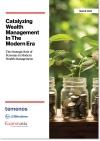Latest Insight
- Why cash is still prevalent in Asia
- Japan steps up green finance efforts
- South Korea charts middle path on crypto
- Should Grab and GoTo merge?
- Singapore pushes ahead with fintech-driven sustainability
- Digital banks in South Korea continue to thrive
- Billease is the rare profitable BNPL firm
- Fintech sector in Pakistan faces mounting challenges
- Where digital banks in Asia can make a difference
- Cashless payments jump in Vietnam
Latest Reports
-
Innovate to Elevate
 In the dynamic and diverse financial landscape of the Asia-Pacific (APAC) region, banks are at a pivotal juncture, facing the twin imperatives of innovation and resilience to meet evolving consumer expectations and navigate digital disruption. Catalyzing Wealth Management In The Modern Era
In the dynamic and diverse financial landscape of the Asia-Pacific (APAC) region, banks are at a pivotal juncture, facing the twin imperatives of innovation and resilience to meet evolving consumer expectations and navigate digital disruption. Catalyzing Wealth Management In The Modern Era Hyper-personalized wealth management presents a paradigm shift from traditional models relying on static, generalized segments. Developing tailored investor personas based on psychographics, behaviours and fluid financial goals enables financial institutions to deliver rich and tailored customer experiences that resonate with next-generation priorities. Navigating the Future of Fintech in Asia
Hyper-personalized wealth management presents a paradigm shift from traditional models relying on static, generalized segments. Developing tailored investor personas based on psychographics, behaviours and fluid financial goals enables financial institutions to deliver rich and tailored customer experiences that resonate with next-generation priorities. Navigating the Future of Fintech in Asia Although fintech has been a global phenomenon, nowhere has the combination of finance and technology been as impactful as in Asia. This report examines some of the key fintech trends that have been re-shaping Asia’s financial industry thusfar as well as examine the trends that will shape the future.
Although fintech has been a global phenomenon, nowhere has the combination of finance and technology been as impactful as in Asia. This report examines some of the key fintech trends that have been re-shaping Asia’s financial industry thusfar as well as examine the trends that will shape the future.
Events
| April 23, 2024 - April 25, 2024 Money 2020 Asia 2024 |
| October 21, 2024 - October 24, 2024 Sibos Beijing |
| November 06, 2024 - November 08, 2024 Singapore Fintech Festival |
Does China need yet another stock exchange? That has been the question of many of our minds since first hearing about the Beijing Stock Exchange, a rejigging of the existing over-the-counter New Third Board. It came about amid a push by Chinese President Xi Jinping to boost onshore capital markets and create an enduring fundraising channel for China’s chronically underfunded small and medium-sized enterprises (SMEs). To that end, the minimum market cap to join the Beijing exchange is just US$31.3 million, significantly less than China’s other exchanges.
Indonesia’s peer-to-peer (P2P) lending sector has grown expeditiously in recent years, with significant benefits for financial inclusion in Southeast Asia’s largest economy. Put simply, P2P lenders can serve markets that incumbent lenders cannot. However, risk is also higher in every way because P2P lending lacks a robust regulatory regime. The challenge for Indonesia’s Financial Services Authority (OJK) is striking the right balance between encouraging healthy industry development and preventing malfeasance and excessive borrower delinquency.
Throughout Asia, e-commerce platforms are adding fintech functions as they look to build more comprehensive digital services platforms. Unfortunately for e-commerce platforms in Taiwan, regulations make it very difficult for them to offer banking services. This is by design: Taiwan’s financial regulators want to prevent internet companies from fomenting too much disruption in the financial services sector.
The Philippines is accelerating digitization of payments, both domestically and cross-border, in line with a goal of the country’s central bank (BSP) for 50% of retail payments to be cashless by 2023. One of the most important new developments in this space is the link-up between the respective real-time and QR payments systems of the Philippines and Singapore.
Singapore's largest banks have performed strongly throughout the year, and the third quarter was no exception. In the July to September period, the city-state’s three largest lenders (DBS, OCBC and UOB) once again beat analysts’ forecasts.
As Southeast Asia’s largest economy, Indonesia is among the most important market in the region for the financial services sector. With that in mind, Indonesia’s steady adoption of digital banking represents a huge market opportunity for both fintechs and incumbent banks engaged in digital transformation.
Australia's long buy now, pay later (BNPL) honeymoon is winding down at last. One of the reasons BNPL has been so lucrative in Australia is that the platforms have not yet been constrained in the way credit cards are. However, for consumers and the overall financial services market, Australia’s imminent BNPL regulation is for the best. Far from innovation killing, regulation should compel BNPL platforms to address problem areas in their business model and ultimately make it more sustainable.
U.S. credit card firms have waited many years to be granted substantive access to the China market. In the meantime, China’s state-owned payments giant UnionPay has built a card empire in the country, while Alibaba and Tencent have come to dominate digital payments. Among U.S. card companies, American Express is the only one currently permitted to process renminbi transactions, having gained regulatory approval in June 2020.
In early October, Toss Bank finally went live in South Korea. The process took several years and hit a few bumps in the road. The country’s third digital lender had to reapply for a digital bank license after its initial application was rejected in May 2019. Regulators gave Toss preliminary approval in December 2019, but nearly two more years were required before it could launch. As it turns out, Toss is entering the market amid the first real fintech crackdown in South Korea, which has important implications for its growth trajectory.
The buy now, pay later (BNPL) craze is sweeping Asia Pacific, growing briskly in markets from Australia to Indonesia. Like many other segments of fintech, BNPL is present in Taiwan, but the situation is a bit different from elsewhere. Major online retailers in Taiwan have offered interest-free installment payments for years, but typically in cooperation with major banks, which are authorized lenders. Dedicated BNPL platforms are another story.
More...
While a certain amount of hype surrounds digital banks, one thing about them is for sure: Their very presence intensifies competition in the market, drawing attention to incumbent complacency. Now that Malaysia’s central bank plans to issue five digital banking licenses in the first quarter of 2022, the country’s traditional banks are moving to head off the challenge – or at least prepare themselves well.
The digitization of life since the coronavirus pandemic began has made life more convenient in many respects. However, there is a downside to all of the digital activity: Criminals are now more active online than ever, and Singapore is no exception. The city-state known for its low crime rate – extremely low when compared with other developed countries – is a grappling with a surge in online crime, with loan and investment scams especially problematic.
Compared to many of its neighbors, Thailand has been digitizing its financial sector at a slower pace. Southeast Asia's second-largest economy has no digital banks – not even any framework for digital lenders – and until recently, no fintech unicorns. Ant Group-backed Ascend Money is Thailand’s first.
South Korea’s fintech crackdown has delayed Kakao Pay’s IPO and likely will force the company to do some restructuring to meet regulatory requirements. Kakao Pay’s parent company has also felt regulatory ire. Yet Kakao Bank, the digital bank unit of the platform company, has continued to perform well, as have its competitors K bank and Toss.
It was only a matter of time before buy, now pay later (BNPL) caught fire in India. All of the necessary elements are in place, from high internet connectivity and low credit card penetration to booming fintech investment and strong demand for alternative digital-first credit. A flurry of deals in recent months signify BNPL’s ascendancy on the subcontinent.















